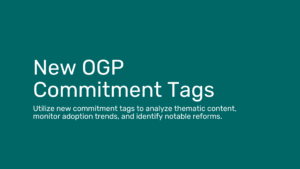
OGP Local Circle on Climate Action Meeting
Join OGP, the Scottish Government and the city of Buenos Aires on the first meeting of the OGP Local Circle on climate action on April 13.
In the face of intensifying climate change, resilient governments will require new policies and innovations. The values of open government – transparency, public participation, and accountability – allow governments and citizens to see the true costs of pollution, discuss alternative approaches for development, and ensure there is adequate public oversight of government action.
Overview | Recommendations | Partners | Documents | Commitments | Recent Posts
Environmental policies have long been the crucible for open government – from instituting public participation through environmental impact assessments, to disclosure through pollutant release transfer registers, to publishing enforcement and compliance data online. Of course, the challenges of the global climate require new policies, instruments, and innovations to ensure maximum resilience against intensifying climate changes.
Transparency allows governments, citizens, and markets to see the true cost of pollution and develop responses to that information. It also provides information on the amount of subsidies granted to fossil fuel and related industries. Public participation creates opportunities and forums to discuss and weigh alternative approaches for development. This is especially vital for vulnerable communities who are disproportionately impacted by climate change but who may not typically have a seat in decision-making spaces. Finally, ensuring that there is accountability for decision-making, through adequate access to justice, public oversight of decision-making, and well-established grievance and dispute resolution mechanisms can help ensure safer and healthier communities.
The added pressure of protecting against the worst effects of climate change requires additional innovation. Open data and access to information on greenhouse gas (GHG) contributions can help drive innovation and identify high return-on-investment alternatives to GHG-intensive activities. Public participation in legislation, regulation, and planning for both mitigation and adaptation can increase public buy-in and improve public awareness. This is critical in planning for the increasingly unpredictable and sometimes disastrous effects of a warming world.
As countries rebuild from the devastating e!ects of the COVID-19 pandemic, governments have an opportunity to think long-term and invest in a more sustainable future. Many OGP members have created new green initiatives and dedicated recovery spending to green transitions. However, such measures make up only a small fraction of these large amounts of recovery funds, even in countries that portray themselves as climate leaders. Looking ahead, open data about ‘green’ initiatives and contracts as well as oversight of large sums of money – whether domestic or international resources for climate adaptation or mitigation – will be critical to reducing potential for misuse and corruption.
OGP members are making more environment and climate commitments in recent years. Commitments have often focused on publishing data and research about pollution and climate change, and some commitments seek to involve citizens in environmental policy-making through climate resiliency programs and conservation efforts. Fewer commitments on environment and climate involve public accountability elements, but almost all that do have been evaluated by OGP’s Independent Reporting Mechanism as highly ambitious.
Governments and civil society alike can use the OGP platform to act and subsequently share their innovations to help mitigate the worst effects of climate change.

Join OGP, the Scottish Government and the city of Buenos Aires on the first meeting of the OGP Local Circle on climate action on April 13.

Explore how open government approaches can support ambitious and equitable climate actions that are backed with the political will and institutional capacity to implement them.

Environment and climate commitments made by members of the Open Government Partnership (OGP) have been consistently rated as highly ambitious and effective...
Greater Scope of Transparency
Civic Participation
Institutional Reform
Environment and climate commitments made by members of the Open Government Partnership (OGP) have been consistently rated as highly ambitious…
2023, Document, PDF
This toolkit by the Open Contracting Partnership will help you to rethink sustainable public procurement driving better adoption and measurement…
2022, Outbound Link, Web Page
A look at global progress and member-level examples of environment and climate work in OGP
2021, Document, PDF
Explore how open government approaches can support ambitious and equitable climate actions that are backed with the political will and…
2021, Resource, Web Page
The World Resources Institute and Open Data Charter promotes greater accessibility of climate-related data by building government officials’ and other…
2021, Outbound Link, Web Page
Explore how the City of Buenos Aires, Argentina is working to be a more resilient, inclusive and carbon neutral city.T
2020, Outbound Link, Web Page
Effective responses to fight climate change require the collection, sharing and use of data. Explore findings from the Open Data…
2020, Outbound Link, Web Page
The economic, social, climate, and health crises of 2020 are undoubtedly costly, but they present an opportunity to build back…
2020, Guidance Document, Web Page
Snapshot of global progress and member-level examples of natural resources work in OGP
2019, Document, PDF
2017, Document, PDF
As OGP co-chairs in 2016-2017, the Government of France and World Resources Institute made climate change and sustainable development core…
2017, Resource, Web Page

Utilize new commitment tags to analyze thematic content, monitor adoption trends, and identify notable reforms.



What is the Open Government Challenge and why was it launched? The Open Government Challenge is a call to action for all members to raise ambition in ten areas of open government to help strengthen our democracies and improve our…

Explore global progress and member-level examples of open government work in each of the selected policy areas and various regions.
Click here for more information about the Open Government Partnership's terms of use.
Terms & Conditions Close